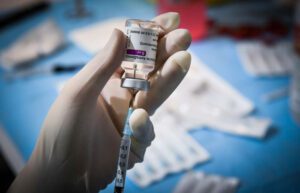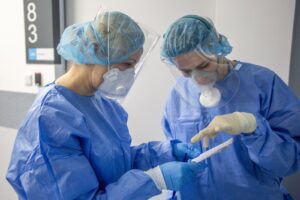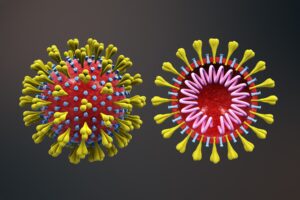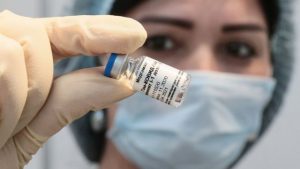
Ukraine has agreed with the Indian manufacturer Serum Institute to increase the supply of vaccines against coronavirus (COVID-19) disease to 15 million doses, Health Minister Maksym Stepanov has said.
“During negotiations with the owner of the Serum Institute, Mr. Cyrus Poonawalla, an agreement was reached to increase the supply from 10 million to 15 million doses of vaccine,” he said at a briefing on Tuesday.
Stepanov also said that “there is a proposal from the Chinese company Sinovac.”
“We have reached an agreement with them to increase supplies and additional contracting,” he said.
Stepanov said that Ukraine currently has contacts for the supply of 42 million doses, but intends to increase the agreement to 48 million doses in 2021, which will allow 70% of the adult population to be vaccinated.

The Indian strain of coronavirus, which causes COVID-19 disease, is less dangerous than the British strain of coronavirus, experts at the Institute of Molecular Biology and Genetics of the National Academy of Sciences of Ukraine say.
“In our opinion, the British strain of the coronavirus is much more dangerous than the ‘Indian’, which has spread widely across Europe and Ukraine,” Director of the Institute Mykhailo Tukalo told Interfax-Ukraine, referring to the results of a study of the Indian strain by the Institute’s specialists.
Tukalo noted that the Indian strain has a new combination of mutations that are dangerous in terms of infectious properties, which were previously separately identified in different strains of the coronavirus.
“Thanks to these mutations, the virus penetrates into human cells faster. The genome of the Indian strain has about 25 mutations compared to the reference Wuhan strain,” he said.
The scientist recalled that another dangerous strain of the coronavirus, South African, has already been discovered in Ukraine, regarding which “the facts of the action of existing vaccines are not encouraging.” Moreover, the Indian strain has a mutation similar to the South African one.
The expert noted that the Indian strain has not been found in Ukraine yet, but has already been recorded in more than 20 countries around the world.
“Perhaps, this strain has not reached our country yet, but perhaps the reason is that very little sequencing is carried out in Ukraine – the study of mutations by decoding the virus genome sequence. Of course, it is necessary to establish constant monitoring and research of coronavirus strains,” he said.
Tukalo stressed that “the study of mutations will allow both to prevent new waves of the disease and to evaluate the effectiveness of treatment, as well as to understand the need to develop and use existing or new vaccines and the introduction of anti-epidemic measures to avoid the spread of dangerous strains.”
“Our institute has a successful track record of sequencing coronaviruses,” he said.
According to the world database GISAID, the “Indian” strain of coronavirus was detected by sequencing in more than 1,500 samples.
As reported, the PRC health authorities have recorded the “Indian” strain of the coronavirus COVID-19 in several cities in China.

The Center for Public Health under the Ministry of Health of Ukraine warns Ukrainians about another type of coronavirus disease MERS-COV, which is spreading in the countries of the Middle East.
“Ukrainians who plan to travel to the Middle East should take into account the circulation of Respiratory Syndrome (MERS-CoV) in the Middle East region. The virus was first diagnosed in Saudi Arabia back in 2012. However, new human cases of MERS-CoV are still being reported, including lethal ones,” the message says.
As noted, Middle East respiratory syndrome (MERS-CoV) is an acute respiratory viral infection caused by the MERS-CoV coronavirus, which is pathogenic for humans.
In particular, the course of the disease may be asymptomatic, and may be accompanied by severe clinical manifestations such as high body temperature, cough and shortness of breath. Often, patients are diagnosed with pneumonia.
According to the World Health Organization (WHO), the infectious agent is limited to the Arabian Peninsula. In particular, most cases were reported in Saudi Arabia, Oman, Qatar, Iran, Jordan, Kuwait, Yemen, and the United Arab Emirates. Outside the region, isolated imported cases of the disease were recorded. However, travelers are advised to be vigilant and take into account the likelihood of infection in the listed countries.
“During the period from January 1 to March 11, 2021, Saudi Arabia reported to WHO about seven new cases of MERS-CoV infection, including three deaths. The patients’ age is from 48 to 84 years. Three of them had contact with camels. All infected had concomitant diseases: diabetes mellitus, hypertension or chronic kidney disease. This fact underlines the previously existing evidence that people with just such diseases, as well as lung diseases and weak immunity, become the main target for MERS-CoV,” the Center said.
It is also noted that MERS-CoV infection occurs through direct or indirect contact with camels. The virus is transmitted from person to person within the family.
Travelers are warned before visiting the Middle East to avoid close contact with animals, especially camels, consuming raw camel milk or eating meat that has not been properly processed, to refrain from visiting crowded places, to follow general rules of hygiene such as regular washing hands before and after touching animals and avoiding contact with sick animals, and follow food hygiene practices.

Coronavirus (COVID-19) epidemic in Ukraine is starting to decline, the situation in many regions is stabilizing, Health Minister of Ukraine Maksym Stepanov said.
“We have withstood another jump in the incidence of COVID-19, and gradually the situation started to improve. Now in many regions the situation is stabilizing. We have been observing a decline in incidence in Ukraine within ten days,” he wrote on the Facebook page on Wednesday.
Stepanov said that on the eve of Tuesday, April 13, “was the first day when the number of people discharged from hospitals exceeded the number of hospitalized people by 22.8%.”
He also said that 2,000 fewer patients were admitted to hospitals last week than a week earlier, and several regions, in particular Ivano-Frankivsk and Zakarpattia, left the “red” zone.
At the same time, Stepanov said “some regions, in particular the city of Kyiv, as well as Kyiv, Lviv and Poltava regions, continue to be in the ‘red’ zone of increased epidemic danger and the situation there remains extremely difficult.”
“It is very important to continue adhering to the established restrictions and anti-epidemic measures: wearing masks, using antiseptics, avoiding crowds of people,” the minister said.

Ukraine is focused on overcoming the economic recession caused by the coronavirus (COVID-19) pandemic and appreciates every investor, Chairman of the Verkhovna Rada Dmytro Razumkov said.
“Almost all states of the world are focused on preserving what they have in economic terms, as well as on attracting additional resources, additional investors. Ukraine will also follow this path. We appreciate every investor who comes to our country,” Razumkov said at a meeting with representatives of the American Chamber of Commerce in Ukraine on Monday.
According to the website of the Verkhovna Rada, Razumkov recalled that the parliament in the context of COVID-19 considered a number of bills related to business support. In particular, the law on state support of investment projects with significant investments has recently been adopted, and bill No. 4416 on the activities of industrial parks is under consideration.
Razumkov noted that in order to overcome the economic consequences of the pandemic, there should be joint work at the level of both central and local authorities, as well as cooperation with business representatives.
“It is the business that pays taxes, fills the budget and helps to overcome the challenges that we are faced with today. The state should help business, create conditions for business to develop,” the chairman of the parliament said.
He said that predictable tax legislation and ensuring the rule of law in the state are key to attracting investors.
“For our part, we will move on this issue, including thanks to a constructive dialogue at the level of committees,” the speaker said.
At the same time, Chairman of the Verkhovna Rada Committee on Finance, Tax and Customs Policy Danylo Hetmantsev said that the parliament is actively working on legislation aimed at de-shadowing the economy. According to him, one of the key bills is the bill providing for a tax amnesty.
He said that at the next meeting his committee plans to consider the issue of interchanging and acquiring rates, bills are being drafted on financial services, insurance, credit unions, and the National Securities and Stock Market Commission.
“We understand that tax incentives, no matter how good, are not the main argument in favor of investing in Ukraine. The main argument remains the rule of law. Judicial reform should be the engine in establishing this principle in our state,” Hetmantsev said.
In turn, Chairman of the Verkhovna Rada Committee on Economic Development Dmytro Natalukha said that the bill, which provides for the creation of an institute of the business ombudsman, is one of the key for his committee and can be adopted by the summer.
President of the American Chamber of Commerce Andy Hunder recalled that next year will mark the 30th anniversary of the work of the chamber in Ukraine.
“The Ukrainian chamber is the largest in Europe. We are always glad for dialogue and openness of parliamentarians. We are like the voice of business. Companies who have believed in Ukraine are ambassadors who tell others what is happening in Ukraine,” he said.

As of March 25, about 350,000 people have enrolled for the waiting list for vaccination against coronavirus (COVID-19) disease, according to the website of the Public Health Center.
One can enroll for the vaccination waiting list from March 1 through the Diia portal or mobile application, as well as through the call center of the Ministry of Health.
The center notes that a person does not need to enroll for a waiting list if the person is:
– an employee of the healthcare, education or social sphere, working or staying in boarding schools, nursing homes, etc.;
– soldier;
– an employee of critical structures of state security.
In this case, the employer or the head of the institution will inform a person about the possibility of getting vaccinated.